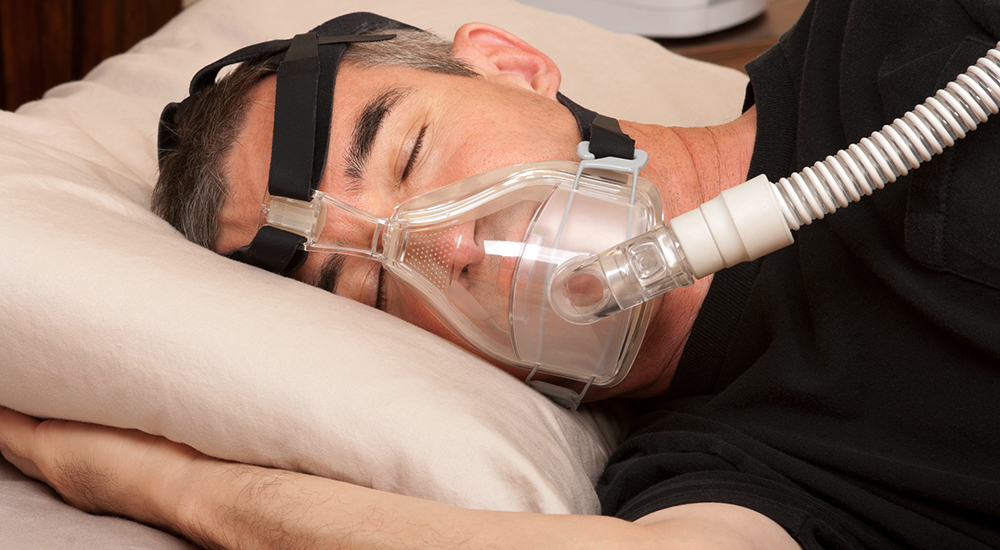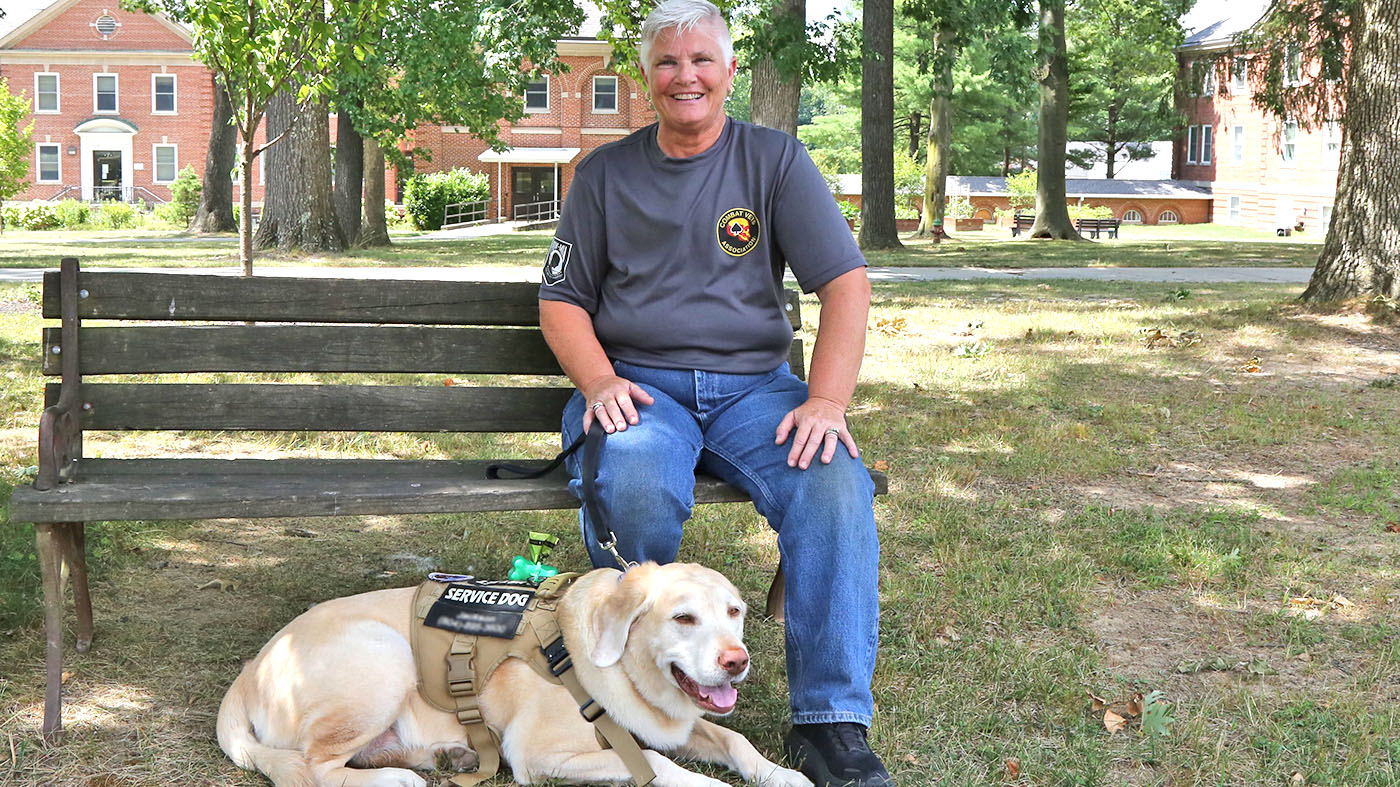VA is working to help Veterans with Obstructive Sleep Apnea (OSA) sleep better at night – using telehealth.
OSA is a condition in which a person’s airway sometimes narrows or closes while they sleep. OSA can disrupt sleep and decreased airflow can strain the heart, lungs, and other organs. The strain can lead to problems such as high blood pressure, heart attack and stroke.
At the Edward Hines, Jr. VA Hospital in Hines, Illinois, Home Telehealth Lead Care Coordinator Nina Giustino, Pulmonary Nurse Practitioner Shireen Long, and Quality Coordinator Mary McCabe have launched a pilot program to improve care for Veterans with OSA.
Veterans who have OSA breathe easier at night by using a Continuous Positive Airway Pressure (CPAP) machine prescribed by their VA providers. The CPAP machine is a small portable pump that sends air through a hose held over the nose and/or mouth by a mask. The mild air pressure widens the airway to relieve symptoms.
But providers have found that Veterans don’t always use their CPAP machines on a regular basis. And they don’t always know how to recognize and troubleshoot issues such as an ill-fitting mask.

Obstructive Sleep Apnea is a condition in which a person’s airway sometimes narrows or closes while they sleep. OSA can disrupt sleep and decreased airflow can strain the heart, lungs, and other organs. The strain can lead to problems such as high blood pressure, heart attack and stroke.
Patients enrolled in remote monitoring program
As a solution, Giustino, Long and McCabe developed the pilot program. Veterans were enrolled into the Remote Patient Monitoring – Home Telehealth (RPM-HT) program and assigned the Obstructive Sleep Apnea Disease Management Protocol (DMP) developed by Cognosante, one of the two RPM-HT vendors.
DMP sessions transmit via RPM technology, which then transmits the information and data regarding their OSA. In addition, the pulmonary program has technology that captures CPAP machine data that is added to the Veteran’s medical record.
This process then allows the RPM-HT care coordinator to review device compliance and trouble shoot barriers with Veterans as well provide education and feedback to the Veteran to help improve compliance and symptoms.
Veterans with OSA often don’t have an in-person follow-up with their provider until three months after their CPAP treatment starts. If the care coordinator detects an issue, they can schedule a telehealth appointment with the Veteran between in-person appointments and coach them on how to use the CPAP machine.
Disease gets worse with not enough oxygen
“With sleep apnea patients, one of the challenges was not being able to have a more immediate response or follow-up to address issues with their CPAP machine,” said Long. “So we wanted to find a solution because, if a Veteran doesn’t use their device, the disease gets worse and there’s not enough oxygen in their bloodstream.”
Giustino, Long and McCabe developed guidelines to educate nursing staff on OSA, CPAP machines and how to troubleshoot problems with device use. This training aids in early detection of a Veteran’s noncompliance to treatment and prevents worsening symptoms.
The goal is for Veterans to use their CPAP machines for four or more hours per night for at least 21 nights over a 30-day period.
With the addition of telehealth, VA providers at Hines have seen an increase in CPAP machine use. Over a 30-day period, CPAP machine use increased from 49% to 57%, and CPAP machine use for more than four hours per night increased from 28% to 41%. Thanks to the pilot program, RPM- HT nurses can solve device issues faster.
Real reward is ability to provide better care for Veterans
This innovative program was a semifinalist in the Veterans Health Administration’s Shark Tank competition.
“The culture of innovation VA fosters enables us to come up with out-of-the-box solutions. And we’re grateful that this idea has been supported,” said Giustino. “As a nurse with prior experience working outside of VA, I think the support for innovative solutions within VA far surpasses what happens in the private sector.”
The groups said that while it was nice having the competition recognize them, the real reward is the ability to provide better care to Veterans. Other VA facilities have reached out to learn how to add this offering for their patients too.
“This whole project has been a collaborative effort at Hines,” McCabe said. “And we’re excited about the potential it has to expand to other facilities and improve care for more Veterans.”
For more information on VA telehealth, visit the VA Telehealth Services website.
Treva Lutes is a program analyst for the VHA Office of Connected Care.
Topics in this story
More Stories
Combat Veteran faces the traumatic events of her PTSD during prolonged exposure therapy and looks forward to the days to come.
Bob Jesse Award celebrates the achievements of a VA employee and a team or department that exemplifies innovative practices within VA.
The Medical Foster Home program offers Veterans an alternative to nursing homes.







You only mentioned CPAP for Sleep Apnea relief? What about the Oral Appliance?
My CPAP provides constant pressure as advertised. However, my breathing stops randomly for 15-30 seconds, then resumes. Sleep study results found severe apnea. CPAP keeps me awake and doesn’t “cycle” airflow for my condition. pressurizing my lungs isn’t helping. Heard of a machine called a Bi-PAP that does cycle. I need to see if I can get one of these from the VA, if available.
I live in Wyckoff nj my VA is in East orange NJ I am a RDK amputee 80 years old on 2/16. I am over weight.
All my medical is taken care of in the private sector. I only use the VA for my prosthetic requirements. What are my options getting the COVID vaccine from the VA?
Thank you
how can i ge disability for sleep apnea
I got a “buddy letter” from a guy i was stationed with in the military that stated how bad I snored which provided information that I had the onset of apnea while in the military.